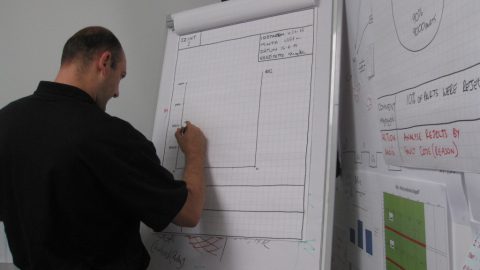
Optimising Layout & Flow
A layout and line balancing improvement activity, supporting the company’s achievement of customer requirements and corporate growth plans, avoiding €2M capital expenditure
Background
The client company is a leading global automotive supplier supporting the sector with manufacturing plants in 29 countries. In late 2011 a plant was built in Hungary to support a major customer’s vehicle assembly operations nearby. The original product line consisted of carpet and load space systems for a vehicle in current production.
The Challenge
At the end of 2012, the company started to install a new line to manufacture the full set of door trim systems for a new vehicle model line. New staff were employed and the line had to ramp up to full volume with a tough target date for full run at rate sign off by the customer. At the same time, the plant had to incorporate the manufacture of 2 other model lines, in line with the corporate capacity and growth strategy. A €2M extension to the plant had been identified to fit in the new business, but the corporate budget was not available.
The Objectives
The plant objectives for the project were 3-fold: to achieve a timely and successful product launch, to re-layout the factory to incorporate the complete manufacturing facility for 2 additional models, without compromising the flow and efficiency of the current products, and to develop the skill level and capability of the current workforce in kaizen activities.
The Industry Forum Solution
A multi skilled team of engineers from the client company worked with an Industry Forum Senior Engineer to create a value stream map capturing all of the issues in the current door trim manufacturing and assembly lines. Two teams (consisting of engineers, supervisors, team leaders and operators) were formed to design a fully aligned future state for the manufacturing and assembly areas. The teams identified and carried out improvement actions to stabilise the current state before starting to implement the current state. The management team took part in a 3 day off site workshop to embed a common understanding of the lean tools and principles, in order that they could fully support the improvement teams by providing resource and removing any ‘road blocks’.
Using the lean principles learned, the teams designed manufacturing systems and layouts, and identified the improvements necessary to allow them to work effectively. The layouts were shared with the project management team together with a spreadsheet modelling the linked flow from manufacturing to assembly. A project plan was devised, the workforce briefed and the new layout was implemented during the Easter shutdown. The integrated improvement activities of the lean teams and the technical engineering/project management team enabled a successful achievement of the targets during the customer ‘run at rate trial’.
The initial improvement activities demonstrated the success of ‘lean’ to the workforce and these were followed up by 4 waves of team leader training to assist the CI manager raise the capability at production team level (particularly in data analysis and problem solving) and embed continuous improvement into all areas. The improvement activities implemented included layout 7 line balance, set up improvement, 5S, waste elimination, standardisation, visual management and development of team SQCDM boards.
Results
The Customer’s View
‘The project has not only assisted us in a successful product launch, but enabled us to integrate 2 new production lines, without the expense of extending the factory and without compromising the flow of the existing products. In fact, the project has enabled us to introduce pull into the manufacturing stage, as well as assembly, reducing batch sizes, WIP and product movement. We have also upskilled our team leaders and spread improvement activities to all areas.’
Source: Industry Forum